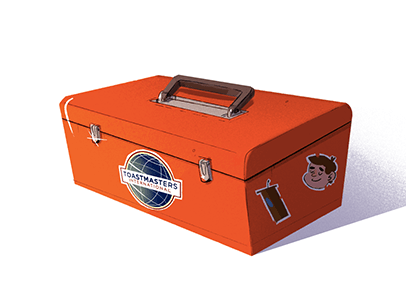
Our questions this month focus on emphasis and expressiveness. I love these questions because they help us identify several key elements of speech delivery.
What are some ways you can be more expressive when giving a speech?
When I first joined Toastmasters, I thought about every detail in my speech delivery. I am an engineer, after all. But as time went on, I became more organic and expressive. I let it happen naturally. When you think about every detail, you have too much going on in your head.
Expressiveness includes vocal variety, body language, and facial expressions. However, expressiveness is more a mindset than a collection of skills. It is a willingness to be bigger than you might be comfortable with.
For example, at a recent club meeting, a woman spoke about driving through Montana on a slushy winter’s day. Traffic was slow, but a truck driver behind her wasn’t paying attention and almost rear-ended her. Her speeches are usually fine, but on that day, she was electric. As she described looking in the rearview mirror, it was obvious she was reliving the experience in her mind. And because of that, we were living it with her.
Now, you might be thinking, “How can I be more expressive through my body language?” In my experience, your voice and your body are tied together. If you are expressive with your voice, your body will follow. And vice versa. If it doesn’t, you aren’t expressive enough.
“But, Bill, I’m not that expressive.”
We are all expressive. And we let that out when we are ourselves in casual conversation. It is only when we give a speech that we become controlled. Give yourself permission to be expressive. If you have a sense of humor, let it out, too. Think of yourself as a performer, not a speaker. And push your performance to the next level.
How do you know which words and phrases to emphasize when delivering a speech?
Just like expressiveness, we know what to emphasize in casual conversation. It is only when we are giving a speech that we forget how to do it.
We emphasize words to make our communication clear to our listeners. Emphasis is essentially using contrast to make a point. Vocal variety, body language, and facial expressions all have ways of doing this.
To figure out what words and phrases to emphasize, I suggest the following procedure.
First, write out your speech. Second, consider each sentence. Which words and phrases are important to your message? Which ones are important for your audience members to understand or notice? Underline them. And finally, decide how to emphasize those words and phrases.
Let me give you some examples.
If I am cleaning up a mess in the house, I might ask my wife for a wet paper towel. The most important word is “wet.” So I would emphasize that.
Let’s say that my wife and I are visiting a museum. We might be told to look for a guide with a bright red jacket if we need any assistance. In this case, the most important words are “bright red jacket.”
Lastly, maybe I want to indicate a change. I am a big fan of the Indianapolis 500 auto race. If a driver won for the first time, I would say he is now an Indy 500 winner. The key word is “winner,” and I would stress that.
Hopefully that gives you an idea of which words and phrases to emphasize. Another tip is to put yourself into the minds of your listeners. Where might they be confused? Where might they completely misunderstand your words? Clarify those points with emphasis. You want them to walk away understanding exactly what you said.
Ultimately, your goal is to get to the point where you rely on your natural emphatic skill and not overthink it. We all emphasize key words and phrases in our casual conversation. Work on it long enough and you will get there when delivering speeches too.
EDITOR’S NOTE: If you have a question for The Answer Man, email it to magazine@toastmasters.org for a chance to be featured in an upcoming column.
Questions are occasionally edited for clarity and brevity.
Bill Brown, DTM is a speech delivery coach in Gillette, Wyoming. He is a member of Energy Capital Toastmasters in Gillette. Learn more at billbrownspeechcoach.com.



 Previous
Previous

 Previous Article
Previous Article
